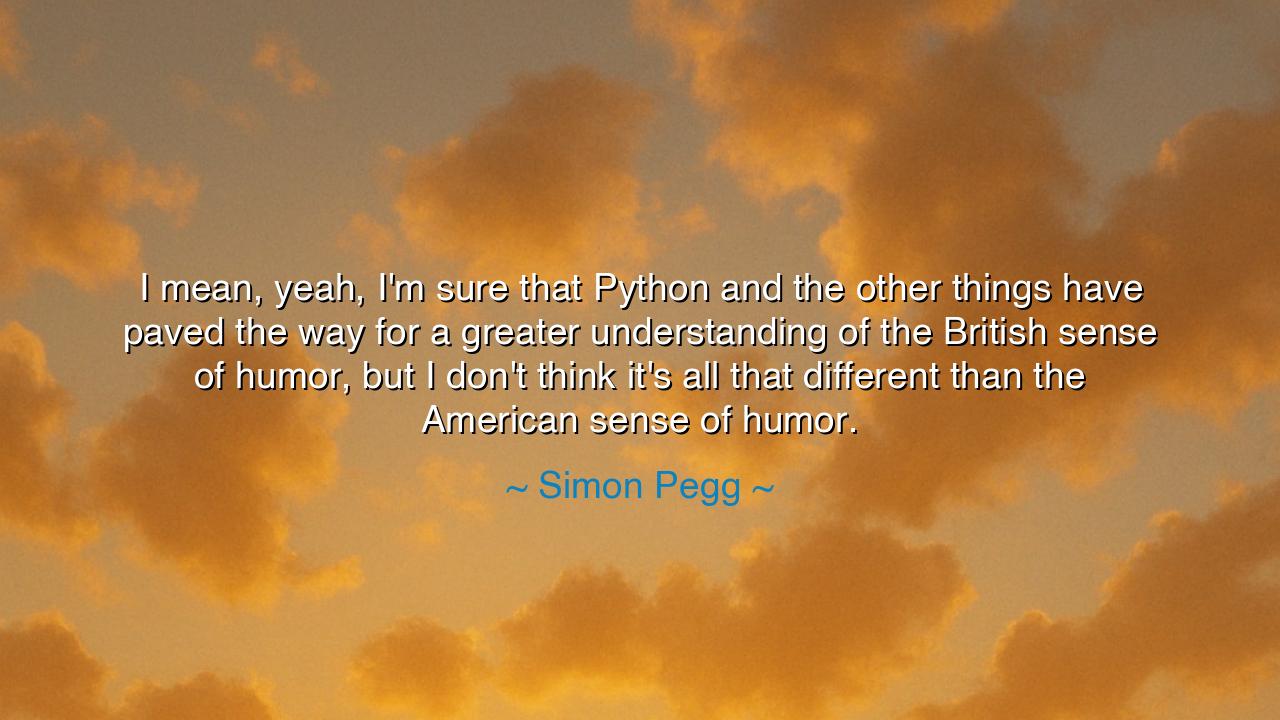
I mean, yeah, I'm sure that Python and the other things have
I mean, yeah, I'm sure that Python and the other things have paved the way for a greater understanding of the British sense of humor, but I don't think it's all that different than the American sense of humor.






The actor and writer Simon Pegg, master of both laughter and reflection, once said: “I mean, yeah, I'm sure that Python and the other things have paved the way for a greater understanding of the British sense of humor, but I don't think it's all that different than the American sense of humor.” At first glance, his words seem simple — a bridge between two cultures. Yet beneath their modest tone lies a profound truth about the unity of laughter, and the shared humanity that lies beneath all differences. Pegg reminds us that while humor wears many accents, it speaks a single language: the language of recognition, of honesty, and of joy.
When he speaks of “Python and the other things,” Pegg invokes the legacy of Monty Python’s Flying Circus, that wild storm of absurdity that changed comedy forever. The Pythons — those British philosophers in clown’s clothing — challenged convention, mocked power, and celebrated nonsense with intellectual brilliance. Their wit crossed oceans and generations, awakening in audiences everywhere a love for the surreal and the satirical. Pegg, a spiritual heir to their comedic rebellion, acknowledges their impact — not merely on Britain, but on the world. And yet, he also reminds us that laughter’s essence is not bound by nationality. The British sense of humor, with its irony and understatement, and the American sense of humor, with its directness and heart, are not rivals but reflections of the same human impulse: to seek truth through laughter.
To laugh, Pegg suggests, is to recognize the universal comedy of existence — the shared absurdity of human life. Whether one stands beneath London fog or New York neon, the humor of the human condition remains the same. The British may cloak it in irony, the Americans may shout it with exuberance, but both spring from the same ancient soil of experience. In laughter, we confess that we are flawed, fragile, and still capable of delight. The accents differ; the emotion does not. Thus, Pegg’s insight becomes a kind of philosophical bridge — a reminder that laughter, like music, belongs to all who have hearts to feel it.
The ancients themselves knew that humor, though shaped by culture, was born of the same divine spark in all peoples. The philosopher Aristotle, in his reflections on comedy, observed that laughter arises from the recognition of human folly — an insight that transcends nation and tongue. In the marketplaces of Athens and the amphitheaters of Rome, audiences roared at the same truths that echo in modern stand-up clubs and television screens: that pride blinds, that love confuses, that life is gloriously ridiculous. Pegg’s words carry this same inheritance — that humor is not British or American, Greek or Roman; it is human.
To understand this, one might recall the story of Charlie Chaplin, a man who spoke no words on screen and yet made the world laugh and weep as one. In his silence, Chaplin revealed that humor needs no translation. The Tramp’s stumble, his dignity in poverty, his optimism amid chaos — these belonged to every soul who ever hoped, failed, or dreamed. Chaplin’s laughter transcended empire and century. In his footsteps walk those like Simon Pegg, who blend wit with compassion, absurdity with truth, reminding us that laughter, though shaped by culture, always flows from the heart of shared experience.
And so, Pegg’s words are not merely about comedy — they are about connection. He sees that humor is one of the few remaining languages that unites a fractured world. It is the mirror in which we recognize ourselves, not as enemies or strangers, but as companions on the same uncertain journey. To laugh together is to remember that we belong to one another, even when everything else divides us. The British irony that teases, and the American enthusiasm that embraces, are simply two notes in the same melody of mirth.
The lesson in Simon Pegg’s reflection is timeless: seek what unites, not what divides. In laughter, we glimpse the truth that humanity is one — flawed, courageous, and endlessly amusing. Do not draw borders around joy; let humor be your bridge. When you laugh, laugh not just at others, but with them — for laughter shared is empathy discovered. Like Pegg, see beyond accent and culture, and you will find that the smile of understanding is the same in every tongue.
So remember, my friends, humor is the world’s oldest form of diplomacy. It crosses walls, melts fear, and reveals that beneath all pretense, we are the same trembling, laughing creatures. The gift of comedy, as Simon Pegg teaches, is not that it divides by wit, but that it joins by wonder. And as long as we can laugh together — truly laugh — no ocean, no border, no difference of culture can ever keep our hearts apart.






AAdministratorAdministrator
Welcome, honored guests. Please leave a comment, we will respond soon